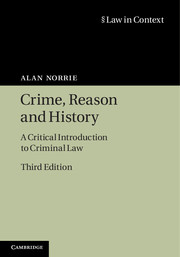Book contents
- Frontmatter
- Dedication
- Contents
- Preface to the third edition
- Preface to the second edition
- Preface to the first edition
- Table of cases
- Table of statutes
- Prologue: A brief history of the ancient juridical city of Fictionopolis
- Part I Context
- Part II Mens rea
- Part III Actus reus
- Part IV Defences
- 8 Necessity and duress
- 9 Insanity and diminished responsibility
- 10 Self-defence
- 11 Loss of control
- Part V Concluding
- Bibliography
- Index
11 - Loss of control
Published online by Cambridge University Press: 05 October 2014
- Frontmatter
- Dedication
- Contents
- Preface to the third edition
- Preface to the second edition
- Preface to the first edition
- Table of cases
- Table of statutes
- Prologue: A brief history of the ancient juridical city of Fictionopolis
- Part I Context
- Part II Mens rea
- Part III Actus reus
- Part IV Defences
- 8 Necessity and duress
- 9 Insanity and diminished responsibility
- 10 Self-defence
- 11 Loss of control
- Part V Concluding
- Bibliography
- Index
Summary
The appellate courts failed to adopt a consistent approach … [T]o fluctuate so often and so significantly on the interpretation of a defence in cases of such seriousness led to confusion and presented a disappointing spectacle.
(Smith and Hogan, 2011, 506)This legislation replaced the former provocation defence … [T]he circumstances in which it applies do not exactly leap from the legislative page.
(The Lord Chief Justice in Dawes, Hatter and Bowyer (2013) at [48])The jury may find it helpful to have the moral basis of the defence explained to them.
(Lord Millett in Morgan Smith (2000) at 352)Introduction
Provocation was, and loss of control is, a partial defence reducing murder to manslaughter. As David Ormerod’s comment in the most recent edition of Smith and Hogan’s Criminal Law suggests, interpreting the law of provocation, as it then was, proved challenging for the higher courts of England and Wales. A string of appeals in the early nineties saw the partial defence to murder expand to include a broader range of cases. These led to decisions in the House of Lords and the Privy Council revealing judicial unease about the law’s trajectory, and conflict among the judges. The matter culminated in the broad decision of the House of Lords in Morgan Smith (2000) on a three to two majority, and then the narrower Privy Council decision in Holley v. Attorney General for Jersey (2005). The latter took up the position of the minority in Morgan Smith, and was adopted by the Court of Appeal in preference to the decision in Morgan Smith that it ought in principle to have followed (James and Karimi (2006)). Such judicial manoeuvring bespoke a significant problem in the law that could not be easily resolved. It is a problem that, we shall see, has its foundations in ethical questions rooted in the law’s modern history.
- Type
- Chapter
- Information
- Crime, Reason and HistoryA Critical Introduction to Criminal Law, pp. 304 - 330Publisher: Cambridge University PressPrint publication year: 2014



